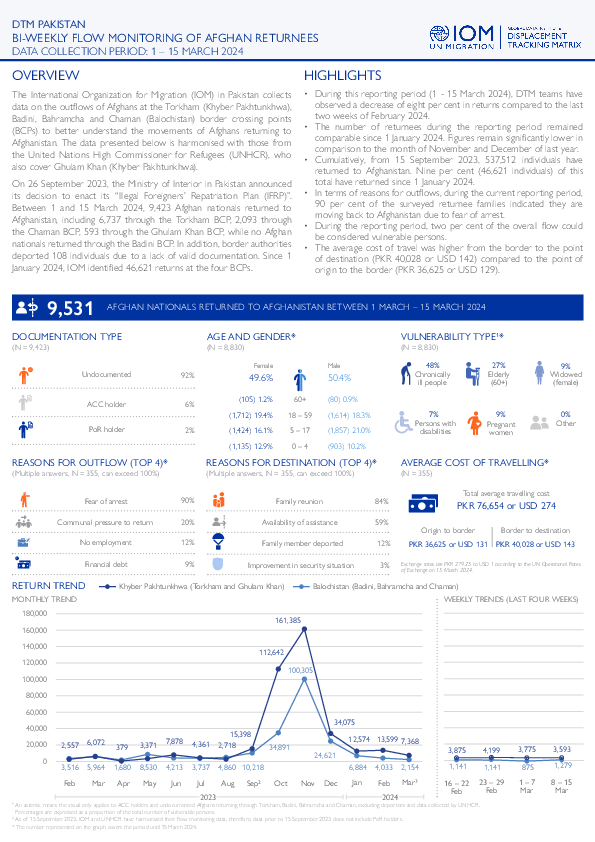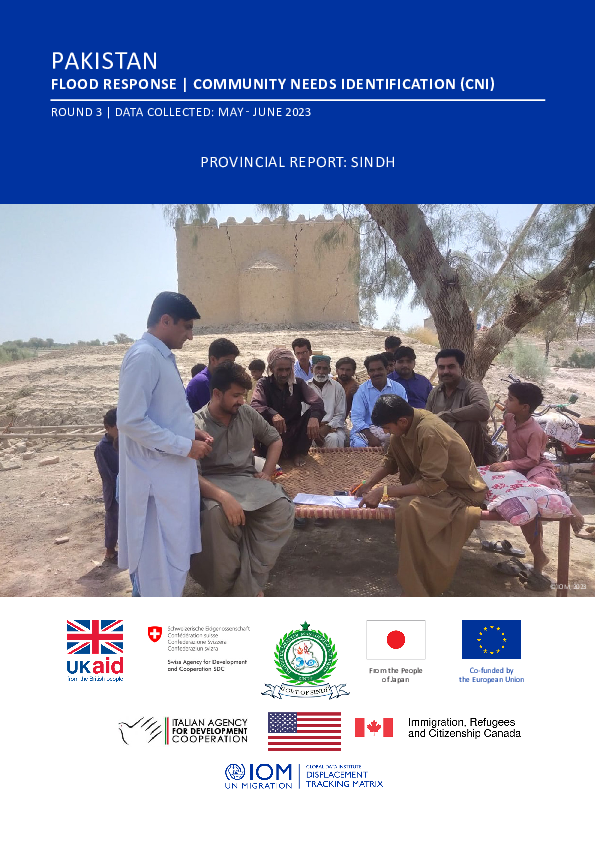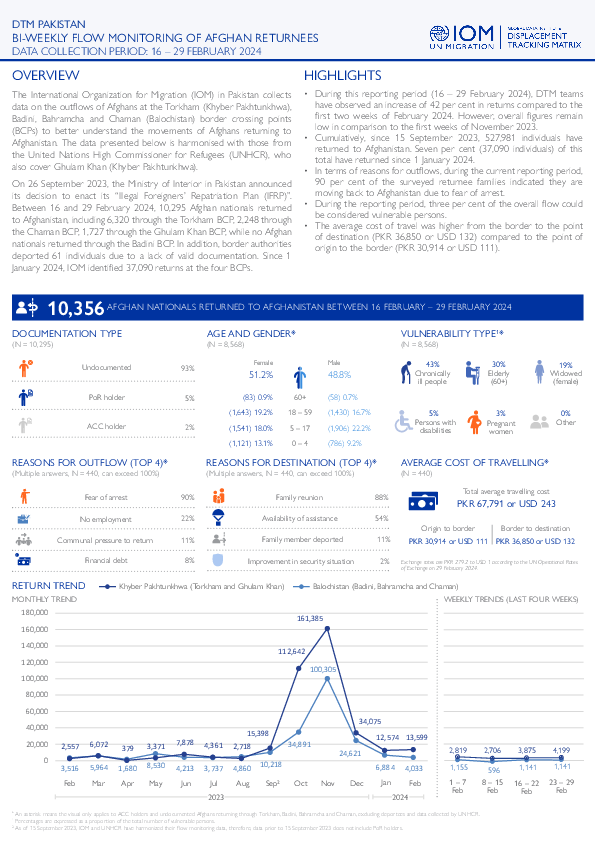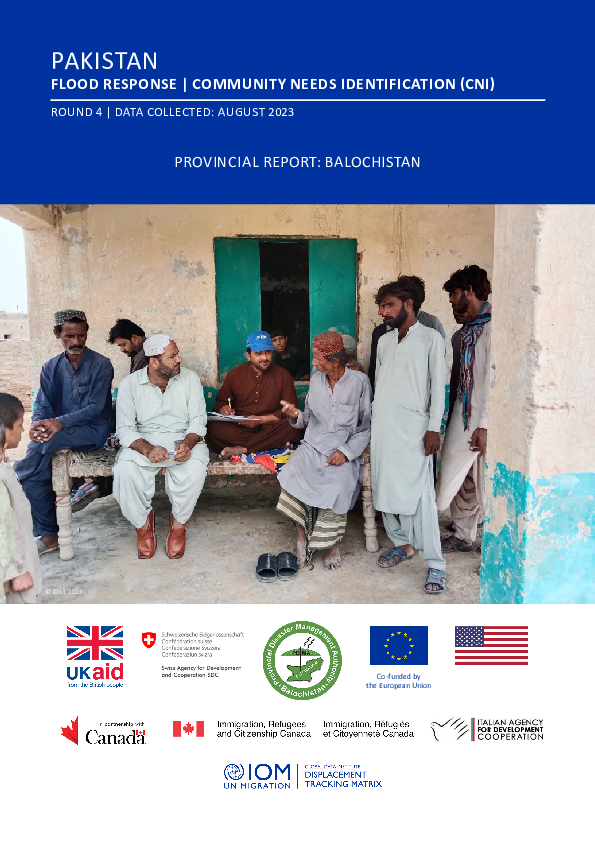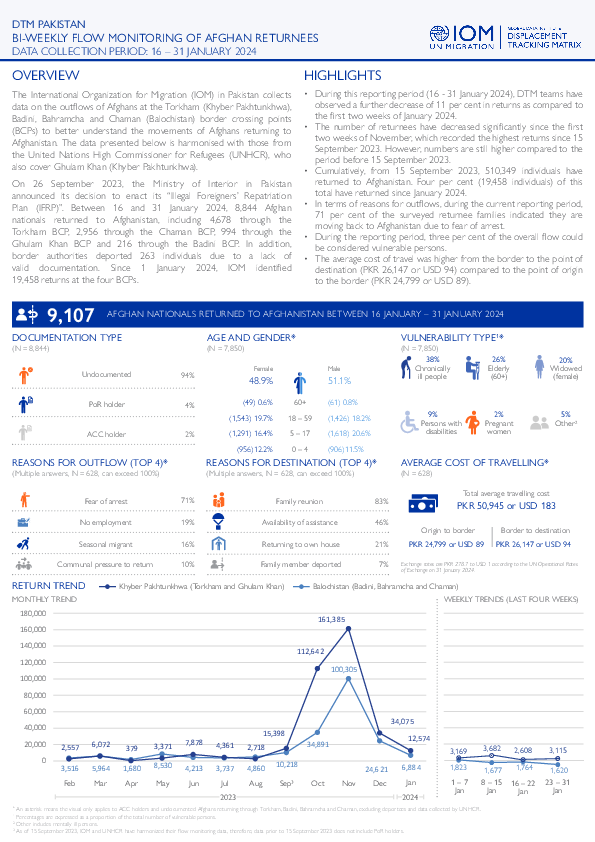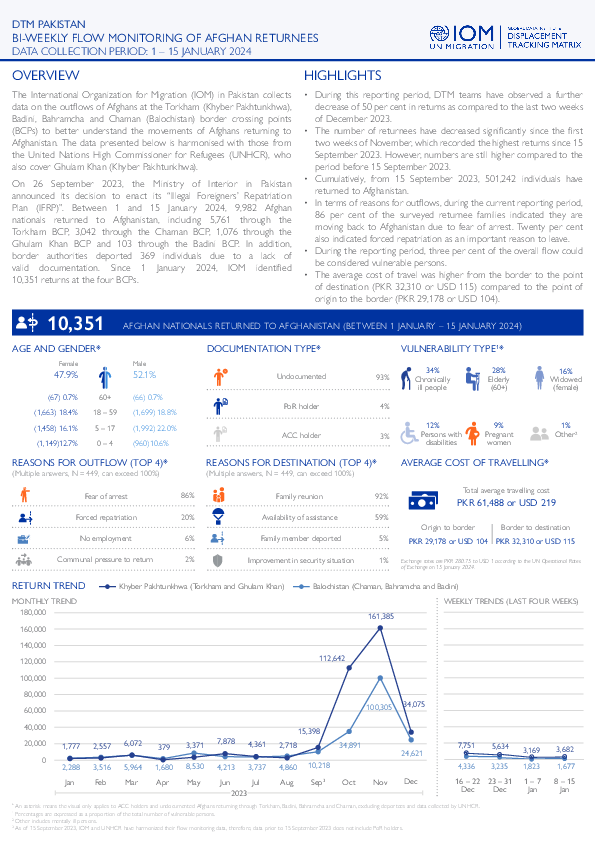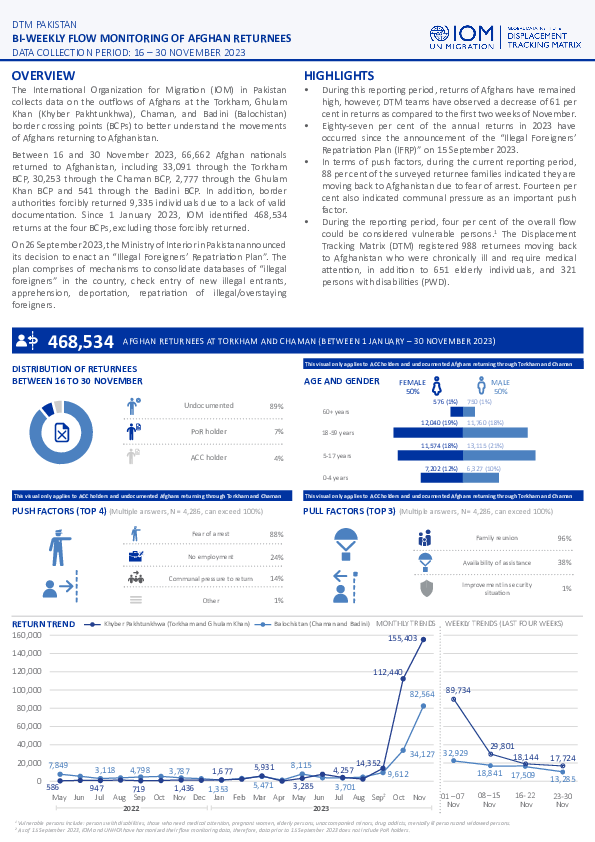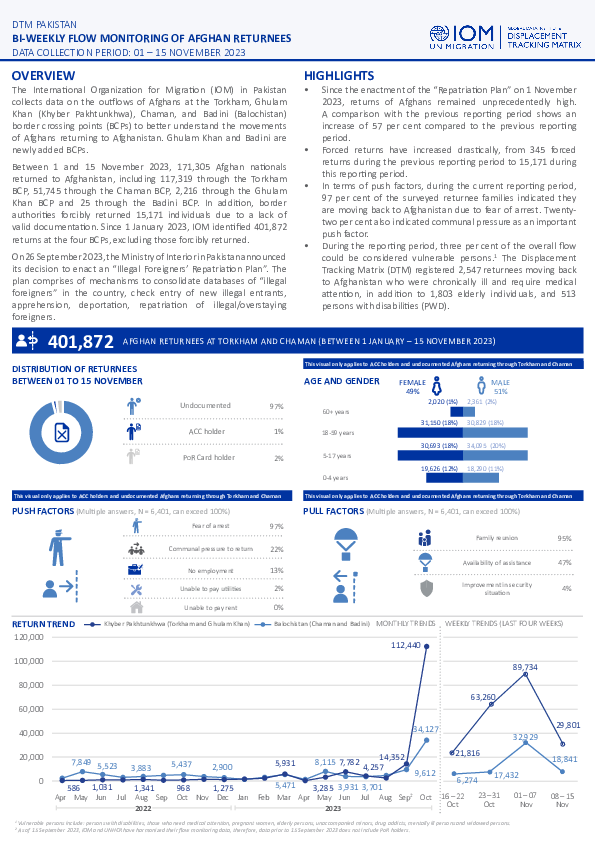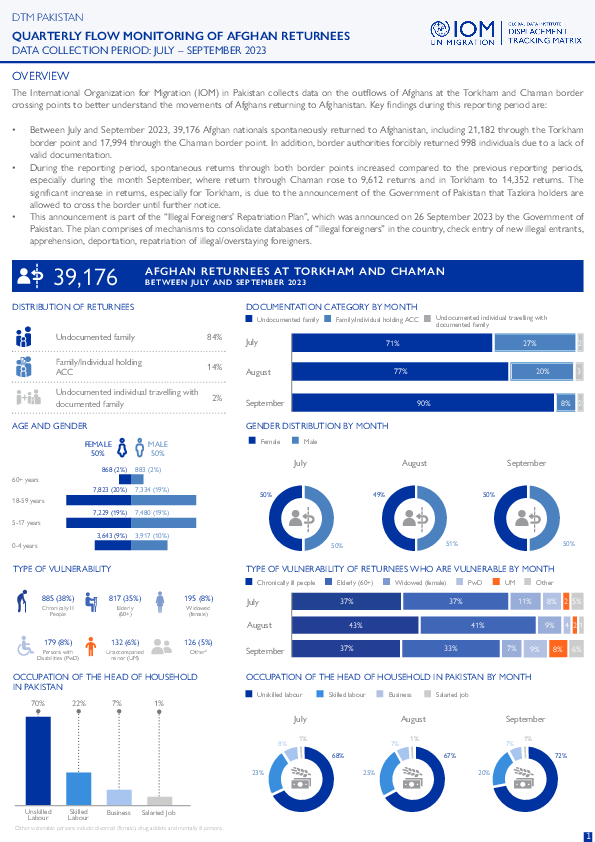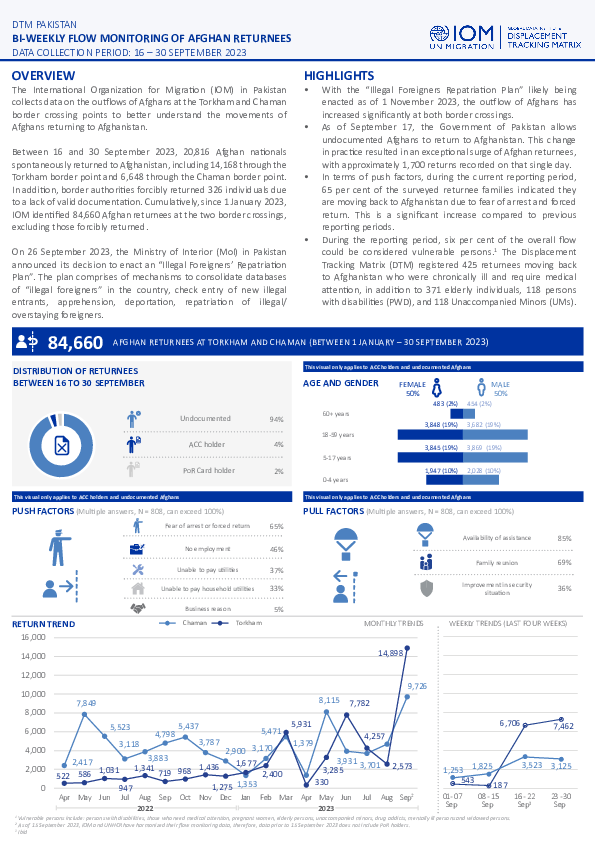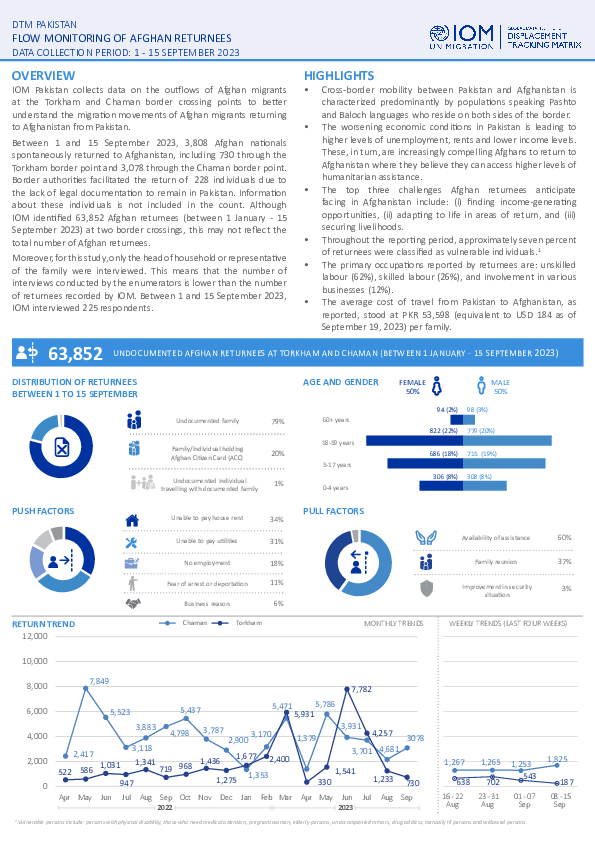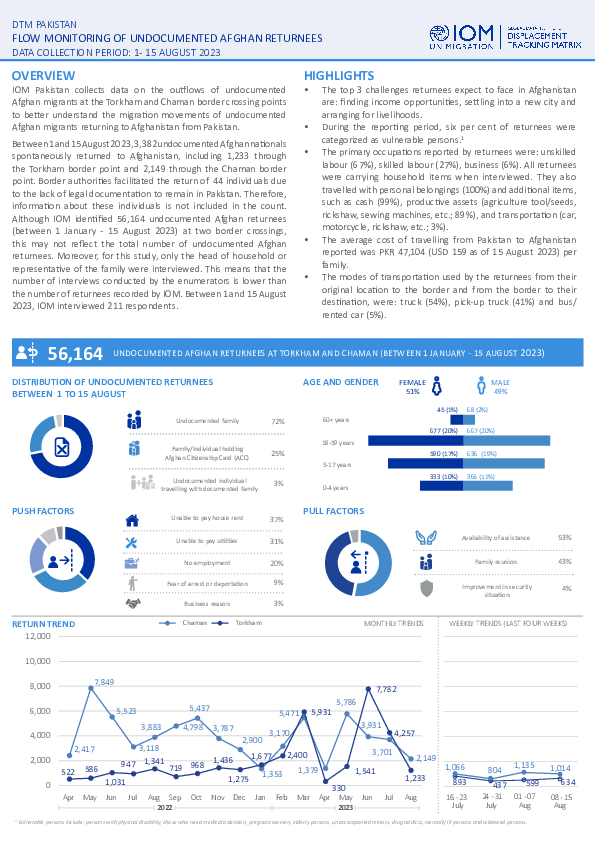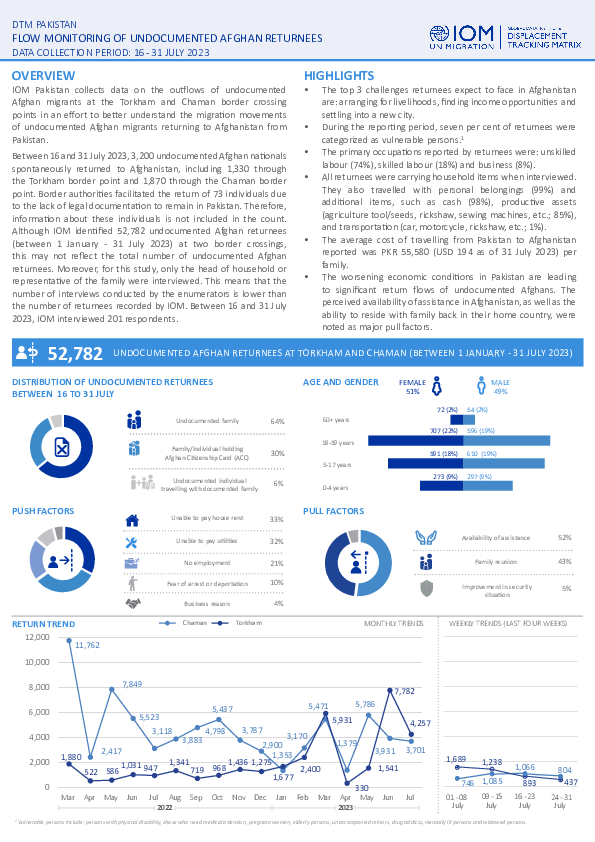-
Countries
-
Data and Analysis
-
Special Focus
-
Crisis Responses
Pakistan
Pakistan
TDPs tracked
Mouvements de déplacement
23,000
IDMC 2023
cycle de collecte de données
À propos Pakistan
In 2010, IOM’s Displacement Tracking Matrix (DTM) programme started its activities in Pakistan as part of IOM’s emergency flood response programme. Over the years, DTM has evolved into a comprehensive programme covering a wide range of activities. The DTM programme works closely together with a wide array of stakeholders, including government ministries and national and sub-national statistical organizations, UN agencies, and specialized research institutes. Its activities are instrumental in providing stakeholders with an evidence-base to effectively address humanitarian, transition, and development needs within the country.
In 2017, DTM started the implementation of its Flow Monitoring (FM) activities. DTM collects FM data at the Torkham (Khyber Pakthunkhwa), Chaman, Badini and Bahramcha (Balochistan) border crossing points (BCPs) to identify cross-mobility patterns and profiles of Afghans who are returning from Pakistan to Afghanistan. The data presented in FM information products is harmonized with those from the United Nations High Commissioner for Refugees (UNHCR), who also cover Ghulam Khan (Khyber Pakhtunkhwa). DTM Pakistan also actively coordinates its data collection efforts with the DTM programme in Afghanistan.
As part of the 2022 flood response, DTM launched mobility tracking operations in flood-affected settlements or settlements that hosted temporary displaced persons (TDPs) across 11 districts in Balochistan and Sindh to provide partners with timely information on the displacement situation. Since then, DTM’s mobility tracking has expanded to cover 30 districts across three provinces (Balochistan, Sindh and Khyber Pakhtunkhwa) and collects information on the multisectoral needs and recovery needs at the settlement level, in addition to the displacement situation.
In May 2023, DTM scaled-up its mobility tracking efforts to support the ongoing response efforts for Afghans in Pakistan. DTM’s Afghan response has been implemented in 33 districts across Balochistan, Khyber Pakhtunkhwa, Islamabad, Punjab, and Sindh, and aims to provide stakeholders with up-to-date information on the multisectoral needs of Afghans in the country.
Furthermore, under the European funded project “Displacement Tracking Matrix Regional Evidence for Migration Analysis and Policy (DTM REMAP), from 2019 to 2022, DTM implemented two household surveys. The first survey was the survey on Drivers of Migration (SDM) which aimed at better understanding the drivers of Pakistani international out-migration. The second survey was the “Returnee Longitudinal Survey (RLS)”. The purpose of RLS was to improve understanding of return migrants’ profiles, vulnerabilities and needs, as well as sustainable return and reintegration outcomes in the short- and medium-term.
Contacter
DTM Pakistan
DTMPakistan@iom.int
Bailleurs de fonds
- EU-INTPA
- ECHO
- Ministry of Foreign Affairs of Italy
- PRM
- Canada – IRCC
- Canada (DFATD)
- Netherlands
Pakistan — Flow Monitoring of Afghan Returnees from Pakistan (1 - 15 March 2024)
On 26 September 2023, the Ministry of Interior in Pakistan announced its decision to enact its “Illegal Foreigners’ Repatriation Plan (IFRP)”.
Pakistan – Flood Response Community Needs Identification (CNI) |Round 4 - Sindh Province (August 2023)
From June to October 2022, storms and heavy monsoon rains in Pakistan caused widespread flooding and landslides across the country.
Pakistan – Flood Response Community Needs Identification (CNI) |Round 3 - Sindh Province (May - June 2023)
From June to October 2022, storms and heavy monsoon rains in Pakistan caused widespread flooding and landslides across the country.
Pakistan — Flow Monitoring of Afghan Returnees from Pakistan (16 - 29 February 2024)
On 26 September 2023, the Ministry of Interior in Pakistan announced its decision to enact its “Illegal Foreigners’ Repatriation Plan (IFRP)”.
Pakistan – Flood Response Community Needs Identification (CNI) |Round 4 - Balochistan Province (August 2023)
From June to October 2022, storms and heavy monsoon rains in Pakistan caused widespread flooding and landslides across the country.
Pakistan – Flood Response Community Needs Identification (CNI) |Round 4 - Khyber Pakhtunkhwa Province (August 2023)
From June to October 2022, storms and heavy monsoon rains in Pakistan caused widespread flooding and landslides across the country.
Pakistan — Flow Monitoring of Afghan Returnees (01 - 15 February 2024)
On 26 September 2023, the Ministry of Interior in Pakistan announced its decision to enact its “Illegal Foreigners’ Repatriation Plan (IFRP)”.
Pakistan —Flow Monitoring of Afghan Returnees (16 - 31 January 2024)
On 26 September 2023, the Ministry of Interior in Pakistan announced its decision to enact its “Illegal Foreigners’ Repatriation Plan (IFRP)”.
Pakistan — Flow Monitoring of Afghan Returnees – Bi-Weekly Report (1 – 15 JANUARY 2024)
IOM Pakistan collects data on the outflows of Afghan migrants at the Torkham and Chaman border crossing points to better understand the migration movements of Afghan migrants returning to Afghanistan from Pakistan.
Pakistan — Quarterly Flow Monitoring of Afghan Returnees (October – December 2023)
The International Organization for Migration (IOM) in Pakistan collects data on the outflows of Afghans at the Torkham (Khyber Pakhtunkhwa) and Chaman (Balochistan) border crossing points (BCPs) to better understand the movements of Afghans returning to Afghanistan.
Pakistan — Flow Monitoring of Afghan Returnees (16 - 31 December)
The International Organization for Migration (IOM) in Pakistan collects data on the outflows of Afghans at the Torkham (Khyber Pakhtunkhwa) and Chaman (Balochistan) border crossing points (BCPs) to better understand the movements of Afghans returning to Afghanistan.
Flow Monitoring of Afghan Returnees – Bi-Weekly Report (01 - 15 December 2023)
• During this reporting period, returns of Afghans have remained high, however, DTM teams have observed a decrease of 51 per cent in returns as compared to the last two weeks of November.
Flow Monitoring of Afghan Returnees – Bi-Weekly Report (16 - 30 November 2023)
Between 16 and 30 November 2023, 66,662 Afghan nationals returned to Afghanistan, including 33,091 through the Torkham BCP, 30,253 through the Chaman BCP, 2,777 through the Ghulam Khan BCP and 541 through the Badini BCP.
Flow Monitoring of Afghan Returnees – Bi-Weekly Report (01 - 15 November 2023)
The International Organization for Migration (IOM) in Pakistan collects data on the outflows of Afghans at the Torkham, Ghulam Khan (Khyber Pakhtunkhwa), Chaman, and Badini (Balochistan) border crossing points (BCPs) to better understand the movements of Afghans returning to Afghanistan.
Flow Monitoring of Afghan Returnees – Bi-Weekly Report (16 - 31 October 2023)
The International Organization for Migration (IOM) in Pakistan collects data on the outflows of Afghans at the Torkham and Chaman border crossing points to better understand the movements of Afghans returning to Afghanistan.
Pakistan – Flood Response Community Needs Identification (CNI) |Round 3 - Khyber Pakhtunkhwa Province (May - June 2023)
From June to October 2022, storms and heavy monsoon rains in Pakistan caused widespread flooding and landslides across the country.
Pakistan – Flood Response Community Needs Identification (CNI) |Round 3 - Balochistan Province (May - June 2023)
From June to October 2022, storms and heavy monsoon rains in Pakistan caused widespread flooding and landslides across the country.
Flow Monitoring of Afghan Returnees – Bi-Weekly Report (1 - 15 October 2023)
Between 01 and 15 October 2023, 37,317 Afghan nationals spontaneously returned to Afghanistan, including 26,896 through the Torkham border point and 10,421 through the Chaman border point. In addition, border authorities forcibly returned 614 individuals due to a lack of valid documentation.
Pakistan — Quarterly Flow Monitoring of Afghan Returnees from Pakistan (July - September 2023)
IOM in Pakistan collects data on the outflows of Afghans at the Torkham and Chaman border crossing points to better understand the movements of Afghans returning to Afghanistan. Key findings during this reporting period are:
Flow Monitoring of Afghan Returnees – Bi-Weekly Report (16 - 30 September 2023)
Between 16 and 30 September 2023, 20,816 Afghan nationals spontaneously returned to Afghanistan, including 14,168 through the Torkham border point and 6,648 through the Chaman border point. In addition, border authorities forcibly returned 326 individuals due to a lack of valid documentation.
Flow Monitoring of Afghan Returnees – Bi-Weekly Report (1 - 15 September 2023)
IOM Pakistan collects data on the outflows of Afghan migrants at the Torkham and Chaman border crossing points to better understand the migration movements of Afghan migrants returning to Afghanistan from Pakistan.
Pakistan — Flow Monitoring of Afghan Returnees – Bi-Weekly Report (16 - 31 August 2023)
IOM Pakistan collects data on the outflows of Afghan migrants at the Torkham and Chaman border crossing points to better understand the migration movements of Afghan migrants returning to Afghanistan from Pakistan.
Pakistan — Flow Monitoring of Undocumented Afghan Returnees from Pakistan (1 - 15 August 2023)
IOM Pakistan collects data on the outflows of undocumented Afghan migrants at the Torkham and Chaman border crossing points to better understand the migration movements of undocumented Afghan migrants returning to Afghanistan from Pakistan.
Pakistan — Flow Monitoring of Undocumented Afghan Returnees from Pakistan (16 - 31 July 2023)
Between 16 and 31 July 2023, 3,200 undocumented Afghan nationals spontaneously returned to Afghanistan, including 1,330 through the Torkham border point and 1,870 through the Chaman border point.


